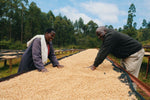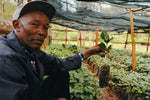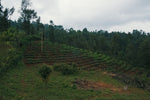SHIPPING
All orders ship out fresh on Tuesdays & Thursdays
Weight: 7/10
Balance 4/5
Cooperative: New Irati Collective
Processing: Washed
Region: Kigumo Murang'a
Farm/Washing Station: New Irati Colelctive
Variety: SL28, Ruiru, Batian
Elevation: 5,000 ft
PURCHASING
Relational trade via Catalyst Trade
A note from our importer:
A couple of hours north of Nairobi and we are scaling the foothills of Mt. Kenya, our silver Toyota High Ace clattering along the red clay cut of road, deep into the terrain of Murang’a County. We slow to turn off at a pale blue gate open to a long drive that we follow down, down to a simple two-room meetinghouse of stone block construction.
Stained by the rust-colored earth, the meetinghouse overlooks a narrow glen housing the structures and mechanicals that constitute the New Irati Factory and Kangiri Farmers Cooperative Society. Farmers naturally bring their cherries to the closest factory, and this co-op is formed of five farmer groups: those of New Irati; Kanguya; Kenjethi; Kangurumai; and Gatumbi. Roughly 3,400 active members strong, the FCS Factories collectively produced over a million kg of parchment last year!
We extract ourselves limb by limb from the van (sensibly designed for a large family of elves) to meet the handful of smartly dressed representatives, all smiles, who have gathered for our arrival. This is the first time they have ever met one of their coffee’s buyers—which shows how much more work there is to do in this beautiful coffee origin.
Below the meetinghouse in the nursery, Nelson Mutuahoru (Machine Operator) showcases young sprigs of SL-28 grafted onto heartier and disease-resistant Ruiru-11 and Batian rootstock. Further downvalley, past the swollen Irati River roaring over a waterfall, we encounter Susan, the Factory Manager, at the Sorting House. This ample, roof-covered workspace of stone and concrete feeds the 4-disc hulling machine operated by Mr. Mutuahoru, and eighty feet of concrete channel empties into the fermentation tanks lined up below. Just beyond the fermentation tanks, drying beds of chicken wire and black plastic mesh stretch out in the sun, mostly empty except for a few harboring the year’s fly crop on this crisp winter morning in late July.












